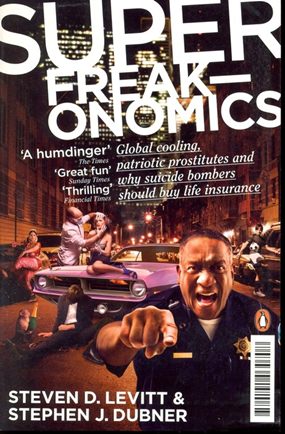This week’s book is a follow-on from Steven Levitt and Stephen Dubner’s book Freakonomics. Super Freakonomics (ISBN 978-0-141-04832-1, Penguin Books, 2011) promises on the cover to tell the reader all about Global Cooling, Patriotic Prostitutes and why Suicide Bombers should buy life insurance.
Now I freely admit that economics was never my strong suit, mine being more of the 2 minus 3 is impossible genre.
By the simple act of applying accurate statistics to any subject Levitt and Dubner changed the way I saw economics. Take, for example, the horse. The ‘engine’ of development before the 20th century.

The horse dragged mankind into the start of today’s development. But at a price. At the turn of the century, 200,000 horses lived in New York, which was one for every 17 inhabitants. Horse accidents killed 200 New Yorkers. And if you think that is interesting, the 200,000 horses produced five million pounds of horse droppings – per day! Much as it is difficult to take in, the piles of horse dung could reach 20 meters in the air and attracted rats and other vermin. And we are worrying about greenhouse gasses? Super Freakonomics suggests that if we consider global warming to be true, historically we will find the solution, despite the fact that right now we do not know what that is (other than horse dung that does not release methane).
The chapters are all self-contained, so you can pick and choose the order you read them in, and the one on why a street prostitute is like a department store Santa, will obviously be an early pick. Here, the data on the world’s oldest profession took a couple of years to collate and then examine minutely. Their ‘star’ lady of the night worked out that prostitution was a business like anything else, and business principles should be applied. With the success she was able to return to university to study. And her subject? Economics.
The authors look critically at suicide bombers and where do they come from. Common wisdom would indicate that they would come from poor backgrounds and to be a ‘martyr’ is the only way to elevate themselves. Not so, say Levitt and Dubner. The study they quote showed that only 16 percent came from impoverished families and more than 60 percent had gone beyond high school, compared to 15 percent of the ‘normal’ population. But the chances of an American being killed in the US by a terrorist attack is 1 in 5 million. He is 575 times more likely to commit suicide!
Much interesting data is included with death by elephant very much more likely than by shark! Yet we love elephants and are afraid of sharks!
A great read for B. 330, complete with bibliography. I really enjoyed reading this book, but I have one major complaint. The font is so small that anyone over the age of 40 has no chance of reading it without a magnifying glass. Sure, you can pack more words in per page and reduce the number of pages needed for a book, but think of the readers, Mr. Penguin!




